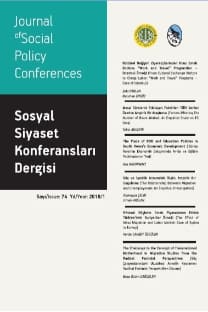Analysis of Social Policy Commitments in the Election Manifestos of the Justice and Development Party: 2002 – 2015
Analysis of Social Policy Commitments in the Election Manifestos of the Justice and Development Party: 2002 – 2015
The opinion that social policy implementation affects voter behavior has caused political parties to include social policy commitments in their election manifestos. Given the perception that social policy has an impact on voting behavior as well as economic and political anticipation, social policy is included in election commitments. In this study, the social policy commitments of the Justice and Development Party, which has been in the lead of general elections held during the period 2002-2015, have been evaluated using content analysis. The research sample includes only social policy commitments in the election manifesto. The aim of this study is to investigate the social policy commitment of the Justice and Development Party and to explain the alteration of the social policy perceptive and the implementation of social protection. In this way, the study attempts to explain the social policy approach of the party.
___
- Alp, H., Turan, E. (2018). Comparative analysis of political parties’ digital technology and innovation policies in the general elections declarations of June 24, 2018. Journal of Social and Humanities Sciences Researches, 5(23), pp. 1068-1077.
- Altıok, M. (2007). The last phase in the neo-liberal structural adjustment process: AKP government. Society and Democracy, 1(1), 57-72.
- Arklan, Ü., Tanacı, F. (2020). An outlook on election campaigns in the context of declarations: A comparative analysis on the local elections of March 31, 2019. Suleyman Demirel University Visionary Journal, 11(26), pp. 1-29.
- Aydoğan, A., Slapin, J. B. (2015). Left–right reversed: Parties and ideology in modern
- Turkey. Party Politics, 21(4), pp. 615–625.
- Aytaç, S. E. (2017). Policy priorities in the election manifestos of political parties in
- Turkey, 2002-2015. Journal of Political Sciences, 26(2), pp. 7-26.
- Beriş, H. E. (2011). JDP 2007-2011 election manifestos: Continuity and change. H. Turşucu and H. E. Beriş (Ed.) Political Academy, 10, 109-141.
- Bulut, P., Güven, S., (2010). Primary education in political parties’ programs. Journal of Theory and Practice in Education, 6(2), pp. 281-300.
- Çelik, A. (2010). Conservative social policy orientation: Charity instead of right-charity instead of obligation. Istanbul University Journal of the Faculty of Political Sciences, 42, 63-81.
- Doğan, A. (2016). The effect of social assistance on the political choices of the poor: A study on the urban poor. Selcuk University Faculty of Communication Academic Journal, 9 (3), 69-89.
- Durmaz, O. S. (2016). Establishment of the neo-liberal social policy regime and the AKP. Work and Society, 1, 143-167.
- Ekici, S. and Acar, A. (2021). Evaluating election declarations of the ruling and the main opposition parties in Turkey in terms of gender inequality. Journal of Ahi Evran University Institute of Social Sciences, 7(1), pp. 287-306.
- Gökçe, O., Akgün, B., Karaçor, S. (2002). Anatomy of the November 3rd elections: Continuity and change in Turkish politics. Selcuk University Faculty of Economics and Administrative Sciences Journal of Social and Economic Research, 2 (4), 1-44.
- Güneş, M. (2012). Sustainability of social assistance as a public administration policy in combating poverty. Journal of Social and Economic Research, 12(24), 149-184.
- Gürbüz, S., Şahin, F. (2014). Research Methods in Social Sciences, Istanbul: Seçkin Publications.
- Kapar, R. (2015). Social Aid in AKP Rule. Koray, M. (Ed.), Politeness, Nature, Market, Social Policy in the AKP Era, Istanbul: İletişim Publications.
- Özipek, B. B. (2011). Justice and Development Party (AK Party) Period Domestic and
- Foreign Policy (2002- ..). Çaylak, A., Dikkaya, M., Göktepe, C., Kapu, H. (Eds.), The Political History of the New Millennium to Turkey from the Ottoman Empire, Ankara: War Publications.
- Özkaynar, K. (2015). The prospect of declaration of 2011 and 2015 elections of the political parties: A document review and content analysis study. The Journal of Academic Social Science, 3(17), pp. 439-452.
- Özsoy, O. (2002). Voting Behavior and Effective propaganda in Turkey, Istanbul: Alpha Broadcasting Press.
- Sakal, M. (1998). Actors involved in the political decision-making process and their roles. 9 Eylul University Faculty of Economics and Administrative of Journal, 13(1), 215–226.
- Sayın, U. and Gümüş, S. S. (2016). The evaluation to political parties’ election declarations in the June 7th 2015 parliamentary general elections on the basis of the content of the disability. Toplum ve Demokrasi, 10 (21), January-June, pp. 69-89.
- Şeşen. E., Ertürk, K. (2017). Reflections of the post-1990’s environmental policies to the election statements in Turkey. Selcuk Communication, 10(1), pp.188-215.
- Tan, A., Baydaş, A. (2017). The effects of voter characteristics on voting behavior. Igdır University Journal of Social Science, Issue:13
- Terkan, B. (2013). Political parties’ discourses and policies concerning woman (The cases of AKP and CHP). Selcuk Communication, 6(2), pp. 115-136.
- Tok, T. N. (2012). Education discourses and policies of political Parties in Turkey. Educational Administration: Theory and Practice, 18(2), pp. 273-312
- Urhan, G., Urhan, B. (2015). Social Aid in the AKP Period. Koray, M. (Ed.), Politeness, Nature, Market, Social Policy in the AKP Era, Istanbul: İletişim Publications.
- ISSN: 1304-0103
- Yayın Aralığı: Yılda 2 Sayı
- Başlangıç: 1948
- Yayıncı: İstanbul Üniversitesi Yayınevi
